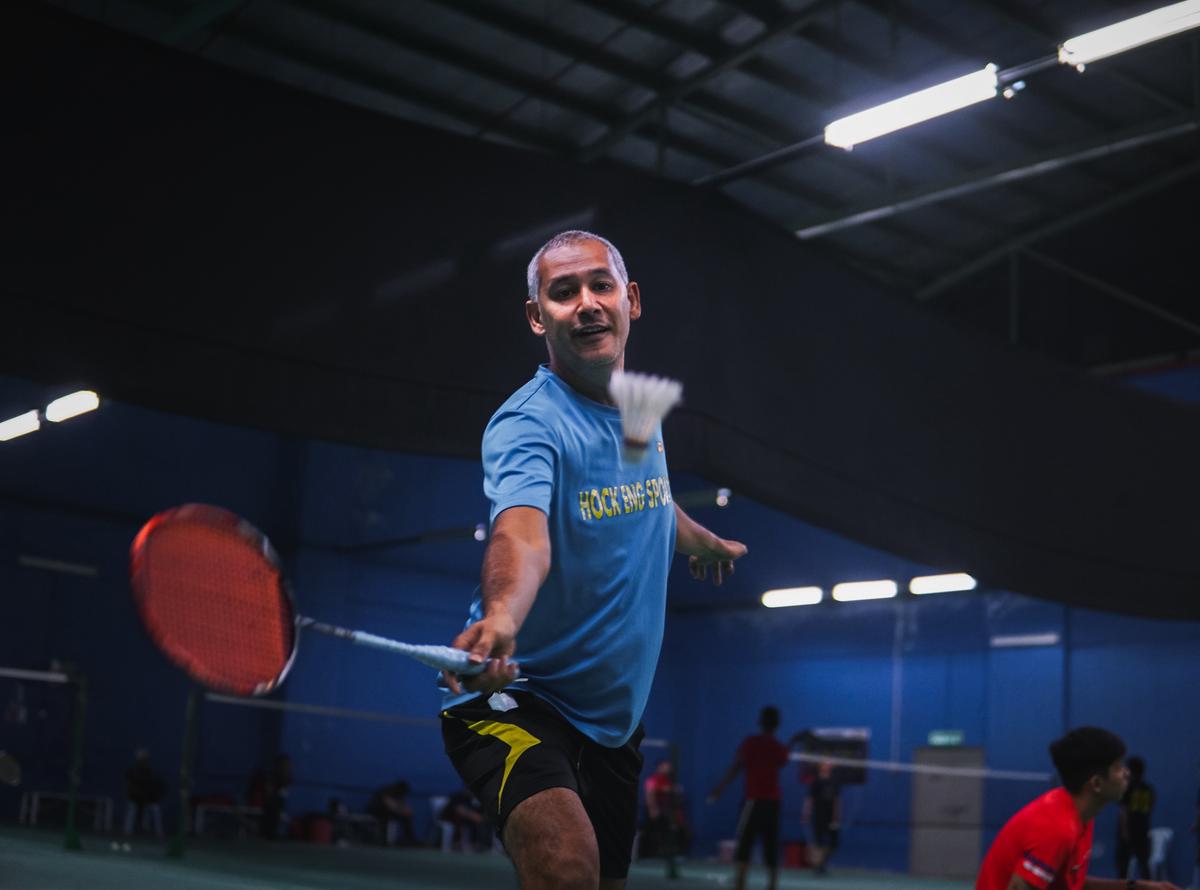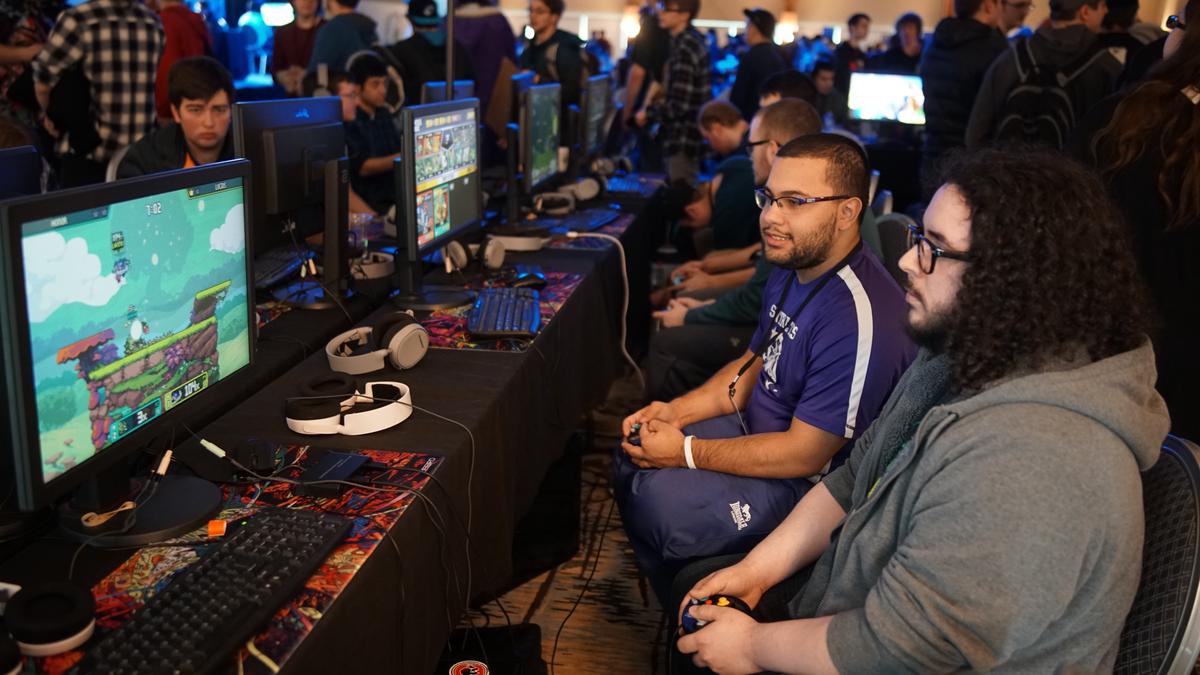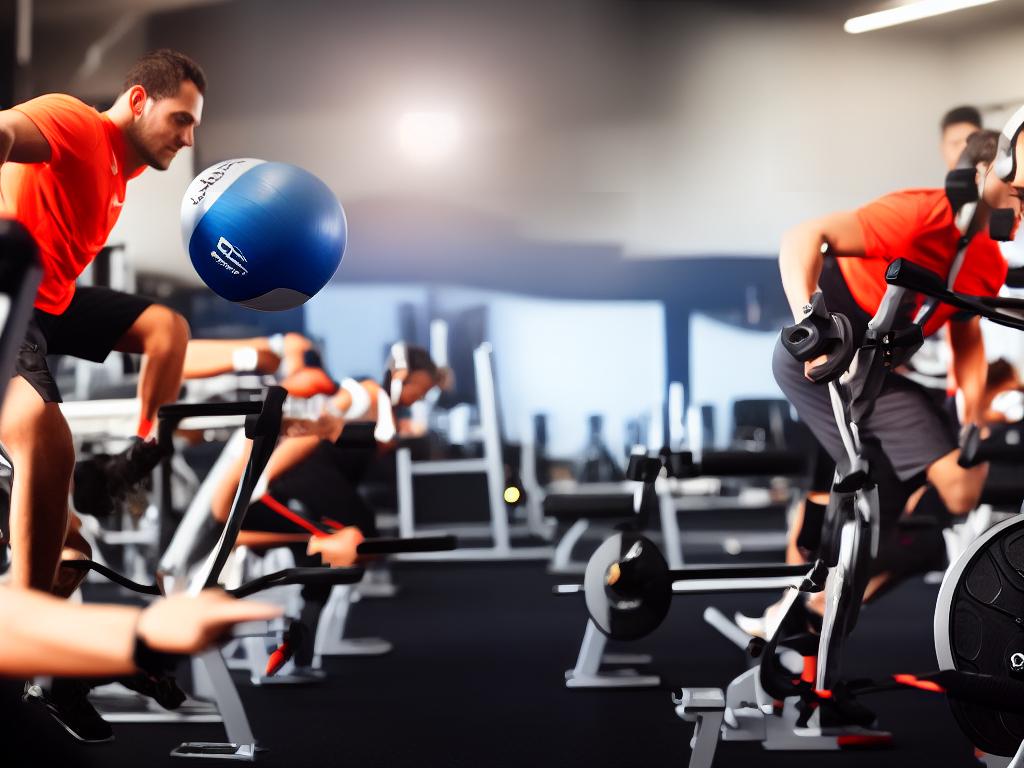The world of E-sports is thrilling, competitive, and increasingly influential in today’s digital age. However, behind the high-intensity gameplay and dazzling digital arenas, the physical and psychological well-being of the players often take a backseat. This comprehensive write-up delves deep into the significance of maintaining physical fitness in E-sports, shedding light on common health challenges faced by E-sports athletes and suggesting an easily adaptable fitness regime specifically designed for them. The endeavor is not only to underscore the importance of physical conditioning for E-sports gamers but also to debunk the myth that their profession doesn’t require bodily upkeep.
Understanding the Importance of Physical Fitness in E-sports
E-sports: Beyond the Virtual Battlefield
Imagine a room bristling with flashing lights and thunderous applause. The stakes, high. The tension, palpable. The competitors, focused. This is the eldritch world of E-sports.
In the dim glow of their computer screens, players perish in epic battles, respawn, fight, strategize, and often achieve remarkable feats in fictitious terrains. The gaming keyboard, the controller, that’s their armory. Their battleground, a digital canvas painted with pixels. A universe driven by zeros and ones.
Yet the players are not just fingers pirouetting over buttons at hypersonic speeds. They’re more than desperate eyes glued to the monitor, foreseeing victory or defeat in fractions of seconds. An E-sport player is a unique blend of the cerebral and the corporeal. And here lies the paradox.
The Paradox of Physicality
The E-sports industry, in the eyes of many, often appear tethered to the shackles of a stereotype – teenagers lost in a virtual world, forsaking natural sunlight and physical vigor. But that’s not the truth.
To secure a coveted place in an E-sports team, to shine amidst the constellation of gamers, one needs to dismiss the mundane. One needs to be nothing short of extraordinary. Like the chess player who ponders each move, like an Olympic athlete who conditions every muscle, an E-sports player trains both the mind and the body.
Why Physical Fitness Matters?
Physical fitness, many may argue, dangles on the periphery of E-sports. After all, the gaming battlefield doesn’t demand fleet-footedness or Herculean strength. But peel layers off this fallacy, and a different truth emerges.
When a match runs long into the night, when muscles tire under marathon session, when vision blurs due to screen time fatigue, when the fingers falter on the keyboard under the weight of exhaustion, victory is often wrestled away by physical limitations. The endurance, cardiovascular health, upper body strength, and hand-eye coordination indispensable to traditional sports find equal importance in E-sports too.
Muscular Endurance in E-sports
At the heart of every victorious E-sport match, lies the relentless dance of fingers over the keys. It might look effortless, but every press, every swipe, every groove, is an exercise of muscular endurance.
A match can span hours. The fingers don’t rest. They hustle. They endure. Muscular endurance helps maintain consistency in gameplay, the difference often between an unceremonious defeat and glorious victory.
Cardiovascular Health
Cardiovascular health might seem distant, divorced from the spectrum of E-sports. It’s not. A healthy heart pumps oxygen-rich blood to the brain, fuelling alertness, honing reactions, sharpening decision-making.
As the adrenaline rushes amidst high-stakes matches, a gamer’s heart bears the brunt, races to the rhythm of the game. An unhealthy heart strains under such scenarios, ironically making E-sports physically taxing.
Upper Body Strength and Hand-eye Coordination
For E-sports players, their upper bodies, especially their arms, shoulders, and wrists, constantly engage in the commanding ballet of gaming. Poor upper body strength leads to discomfort, disrupts focus and undermines performance.
Accompanying this physical attribute, the synchrony between the eye deciphering on-screen cues, and the hand executing decisive moves, reigns supreme. Better coordination promotes speed, accuracy, and sets players on the path to victory.
When it comes to E-sports, many people might imagine it as physically effortless. However, this conception is far from the truth. Players in this digital terrain not only have to call upon their mental capacities, but also their physical readiness. Dispelling any myths about a lack of physical demand in E-sports, this virtual arena blends both physical and digital elements, forging a fresh kind of athleticism.

Photo by muktasimazlan on Unsplash
Common Health Challenges in E-sports
Unifying Mind and Body in E-sports
The energy humming in an E-sports event is unmatched. A dazzling display of lights, combined with the swell of exhilaration and cheers from the crowd creates a spectacle unlike any other. Players are engaged in a virtual skirmish, but the nerves, anticipation and exhilaration that permeates the atmosphere is anything but imaginary.
E-sports athletes stand as pioneers, flaunting their lightning-quick reflexes, precision, and strategic ingenuity. A prevalent perception is that these players swap conventional athleticism for a heightened mental capability. Yet, this view obscures the physical hurdles intertwined with this rapidly growing sporting culture.
Sedentary Threats to Physical Health
E-sports athletes generally remain sedentary for the duration of their training and competitions, a reality that submits them to various health risks. Among them, obesity lurks quietly as a recognizable adversary. This enemy doesn’t come in flashy colors and thrilling soundtracks like their gaming battles. Instead, it creeps in silence, a ticking time bomb in the deceptive comfort of their gaming chairs.
Staring back at health threats, some athletes have already augmented their training regimens to incorporate physical exercise into their daily routines. Yet, echoing the screens they spend hours on, each involves its own unintended consequences.
Much More Than Keyboard Contusions
Beyond obesity, physical problems borne from hours of gaming are not to be dismissed. Carpal tunnel syndrome, which results from nerve compression at the wrist, has emerged as a nemesis to many gamers. Symptoms of numbness, tingling, and sometimes weakness in the hand can impede their gaming prowess and integrity, hence, posing not just a health concern, but a career impediment as well.
Yet, holding their fire power, also known as the mouse or the controller, isn’t all that is at risk. The highly competitive world of E-Sports can leave these athletes with strained eyes, chronic back problems, poor posture, and even deep vein thrombosis—a condition where blood clots form in veins deep in their body—which could potentially be life-threatening.
Mental Health: The Darkside of E-sports
Even as the physiological threats loom, mental health issues cast another disquieting shadow over E-sports. Gaming disorders, characterized by an uncontrollable need to game, have become a recognized affliction by the World Health Organization. This, coupled with the enormous pressure to win and relentless barrage of criticism from audiences, leaves many athletes to grapple with anxiety, depression, and burnout.
They play amidst a swarm of fans and opponents, yet this world can feel painfully isolating when it comes to battling mental health problems.
E-sports is a testament to triumph, dedication, and the resilience within the human spirit. However, behind the unfolding narratives that the pixels display, the real-life players encounter daunting challenges. While their game time requires them to sit for extended periods, the accompanying health risks cannot be ignored. Hence, the fight e-sports athletes face is not solely in game worlds, but also against the real-life health issues that come into play. It’s a fascinating blend of the virtual and the real, where the body and the mind must work in harmony.

Creating an Effective Fitness Regime for E-sports
The Starting Line
In the immersive, high-stakes world of e-sports, athletes engage in battles in vivid digital landscapes, their every move scrutinized by millions of fans online. The level of mental sharpness and strategic thinking required is monumental. In a scenario where the physical demands of traditional sports are replaced with the digital clashes of computer-generated graphics, initially, the idea of a rigorous physical fitness regime might seem unnecessary.
But, in truth, an e-sport athlete’s physical fitness is heavily taxed. The countless hours invested in mastering complex moves using game controllers, keyboards, and mice necessitate exceptional physical skills. Thus, a dedicated commitment to a physical fitness routine often underlies the success of top e-sports athletes.
Mapping the Fitness Trail
Embarking upon the journey to cultivate physical fitness then begins by recognizing the unique demands of e-sports athletes. Unlike athletes in traditional sports that require whole-body movements, e-sport athletes’ physical intensity is skewed towards the fingers, hands, wrists, and arms. So, a targeted fitness regime ought to keep these considerations at its core, focusing on three key areas: flexibility, strength-training, and endurance.
Flexibility – The Key to Precision
One might not instantly connect flexibility with e-sports, yet, maintaining a range of motion in the joints can reduce the risk of injury and improve performance. Stretching exercises for the hands and wrists, for instance, can prevent conditions like Repetitive Strain Injuries (RSI) and Carpal Tunnel Syndrome (CTS). Yoga routines can also assist not only in improving flexibility in these areas but also in enhancing overall body posture – an aspect often overlooked by gamers.
Strength-training – Building a Resilient Arsenal
Strength-training, particularly for the upper body, comes next. It involves exercises like wrist curls, finger lifts, and resistance band routines. Implementing push-ups, pull-ups, and strength training with free weights can help reinforce the larger muscle groups, allowing e-sports athletes to endure the rigors of long gaming sessions without fatiguing.
Endurance – The Marathon, Not the Sprint
Endurance is about staying power, the ability to perform at a high level consistently over a period of time. For e-sports players, this often translates to keeping their composure during extended playing sessions. Cardiovascular exercises like running, cycling, or swimming can build endurance, enabling athletes to maintain physical intensity for longer periods.
Nutrition and Hydration – Fueling the Quest
Lastl #y, proper nutrition and hydration should not be underestimated in an e-sports fitness regime. The brain, being the control center for all physical movements, requires proper fuel to perform efficiently. A diet rich in fruits, vegetables, lean proteins, and complex carbohydrates can provide this fuel, nurturing the body with the nutrients it needs for optimal performance. Moreover, hydrating regularly with water is imperative to maintain concentration levels and prevent dehydrating ramifications of prolonged gaming sessions.
Undeniably, the world of e-sports might be entirely digital, but the strain exerted on its competitors is unquestionably real and tangible. Therefore, for all e-sports enthusiasts, ranging from established gamers to those just beginning their journey, cultivating a comprehensive physical fitness routine is an essential component in achieving e-sports excellence.

Real Stories: Case Studies of E-sports Athletes and Fitness
Finding Fitness in E-sports: The Inspiring Tale of Jake Lyon
Born and raised in Texas, Jake Lyon was simply an everyday guy with a deep-seated love for video games. As a professional Overwatch player, Jake dedicated countless hours every single day to perfect his gaming skills with his squad, the Houston Outlaws. Contrary to popular belief, that often links gamers with unhealthy lifestyles and insufficient physical exercise, Jake stands as a solid proof that gaming and physical health can indeed coexist.
During a typical e-sports competition, Jake had a moment of clarity. He noticed that comparatively less experienced players were surpassing him, leading him to realize that his gaming performance was not solely dependent on swift reflexes and cognitive speed.
Jake identified that his focus would waver during extended gaming sessions, leaving him frequently feeling worn out and sluggish. Although his gaming skills were impeccable, he recognized that he was lacking the necessary stamina and endurance that were crucial for excelling in intense tournaments.
Embracing Physical Fitness: A Game-Changer
Driven by the desire to elevate his gaming performance, Jake decided to integrate physical fitness into his daily routine. He started going to the gym, incorporating a mix of strength training and cardio into his workouts. Initially, it was not an easy feat, especially considering the amount of time he dedicated to practicing Overwatch. However, Jake stood resolute and gradually increased the intensity and duration of his workouts.
As days turned into weeks, and weeks into months, Jake started noticing changes. The lethargy disappeared, and he began to feel more energized. His concentration levels improved, and even his reaction times seemed faster. His overall gaming performance shot up, and he proved himself to be an invaluable asset to the Houston Outlaws.
Perks Beyond Gaming Performance
Physical fitness did not just improve Jake’s gaming performance but also had profound effects on his overall well-being. Jake experienced fewer migraines, which he often experienced after long gaming sessions. His sleep improved, and he seemed to be in a better mood overall. The journey towards fitness transformed Jake’s lifestyle, making him more disciplined and mindful about his health.
A Role Model for E-Sport Athletes
Jake’s journey serves as an inspiring tale for other e-sports athletes. His story validates the importance of physical training in a domain predominantly ruled by mental agility. Through fitness, Jake managed to bridge the gap and prove that apparent contradictions like gaming and physical fitness can seamlessly blend to create extraordinary performers.
Jake Lyon has become a contemporary example of how physical fitness can significantly enhance performance in e-sports. He has debunked the myth that e-sports and fitness are mutually exclusive and continues to inspire others in the dynamic world of e-sports with his persistent commitment to fitness and gaming.

- While E-sports provide an exciting avenue of opportunities, it is essential to remember that gaming performance can significantly improve with the right physical and psychological balance. The incorporation of a fitness routine and healthy lifestyle can mitigate many health issues these athletes often contend with, as illustrated by the real-life stories of professional E-sport athletes discussed in this document. Ultimately, ensuring the well-being of E-sports athletes is a shared responsibility that demands awareness and mindfulness, promoting not only longevity in their careers but also better quality of life.